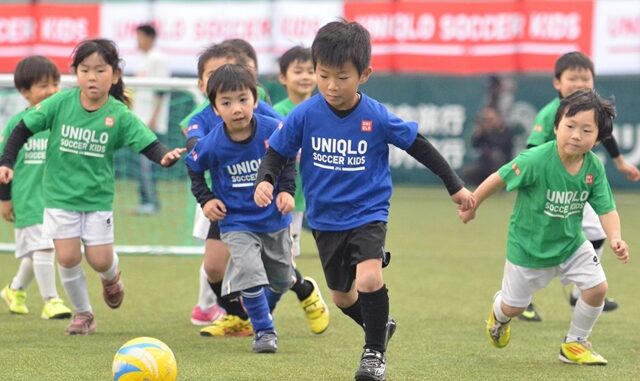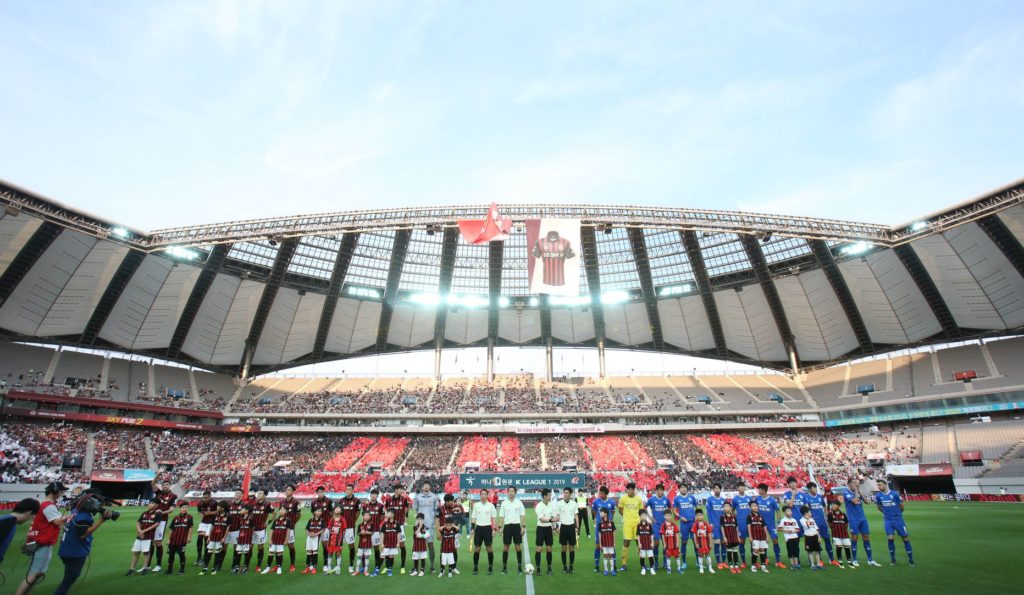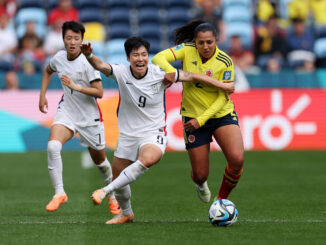

The Asian Game’s coverage of the FIFA World Cup Qatar 2022 is proudly sponsored by SMC.
Legacy: it’s one of the most talked about elements in bidding for any major sporting event yet often just as quickly it fades into the background once the tournament is run, won and over.
In many ways election campaigns to host a World Cup mirror, if not exceed, those of a political nature: promises, pork-barrelling and dreams of a brighter future that often lay unrealised barely months later.
Unfulfilled promises from World Cup bids line the streets from Montevideo to Moscow.
Japan and South Korea are no exception.
Does anyone remember Japan’s promise of the ‘virtual stadium’ (bizarrely rehashed by the JFA in their bidding for the current edition two decades on), a futuristic concept that involved, as the bidding team noted, turning entire grounds into three dimensional theatres with 75-metre wide parabolic screens?
Does anyone remember their promise of a ‘21st century football fund’ where profits derived from the World Cup would be pooled in some sort of global piggy bank for football to dip into?
Much in the same way, few likely remember Korea’s pledge to turn the hosting of the World Cup into some sort of NGO event whereby they promised to turn over every Won made into the coffers of FIFA to be used for the ‘development of the sport.’
The decision to award the co-hosting of the planet’s largest sporting event to a colonial power and their subjugated nation barely half a century on from that bloodshed seemed bizarre at the time and little change has come between the two nations in the intervening decades, either through football diplomacy or via other means.
Squabbles over reparations, the issue of forced prostitution and over ragged, uninhabited, islands jutting out between the two nations continue to this day; so much for the concept of a World Cup legacy as being able to bring a thawing of relations between Japan and South Korea.
The other key promise was in stadium development, a familiar refrain in bidding tussles across the planet.
In Japan, too, legitimate questions can be raised over just what benefit was derived from a spending spree that totalled an estimated $7 billion (in today’s money) in building six new stadiums and refurbishing a further four.
Before the co-hosting arrangement came to light the original list of venues stood at 15 with new or improved stadia pledged for Aomori, Chiba, Kyoto and Hiroshima, plans that were shelved after Japan relinquished on their sole hosting dream.
Of the ten that ended up hosting, two (the ‘Ecopa’ venue in remote Shizuoka and the even more remote Miyagi Stadium) are today barely used at all for football, or indeed any other events, whilst Cerezo Osaka moved out of the old Nagai Stadium several years ago and those in Oita, Niigata and Yokohama are blighted by the all-too familiar sight of an enormous running track in a bid to survive as ‘multi-purpose’ venues.
That leaves only the stadiums at Kobe, Saitama and Sapporo as new, football-specific, venues built for the World Cup that still see active use today which is, putting it mildly, hardly a glittering legacy.
If there was no détente, no global football fund, no glittering collection of new, football-specific, venues and no futuristic stadiums as we were told there would be, then what exactly is the legacy of Asia’s first men’s World Cup as we await, shortly, the second?

It is, for me, something that’s much harder to quantify and that is the shift towards becoming a ‘football nation.’
Two decades ago, when I first visited Japan, you could stroll parks up and down the country and see bat meeting ball meeting gloved hand in a nation reared on baseball.
Today, right across the sprawl of Tokyo and well beyond, you’re far more likely to find children with a ball at their feet with shirts or bottles laying on the ground as makeshift goals.
Baseball still dominates much of the landscape, and is a significantly higher pull for subscription services and other media, but that’s largely driven by an older generation who grew up before the World Cup.
The shift from bat to ball is well and truly on in Japan, the J.League is an established domestic and international brand with 58 professional clubs and a queue to join those ranks.
The average attendance in 2000 at J1 matches was barely 11,000 and by 2019 (before the pandemic) that number had almost doubled to 20,750.
The development of young players is as good as anywhere on the continent and the pipeline of talent moving from the fields of Japan to leading European club teams is a long established one.
None of that would’ve happened, certainly not as quickly, without the World Cup and specifically the success of both co-hosts on the pitch.
It’s well worth remembering that at the time of the hosting being awarded Japan was one of only two nations that had, at that point, never qualified for the global showpiece – the other was way back in the second edition in 1934.
Success on the pitch gave both nations belief that they belong on the global stage, with Japan progressing past the group stage for the first time and South Korea marching all the way to the semi-finals.
Embed from Getty ImagesUnfortunately, two decades on, those remain the high water marks for both nations.
Whereas once Japan and South Korea were viewed as footballing outposts – one European publication described the concept of Japan, in 2002, as much as being a football nation as they are one of fish and chips – today they are viewed as part of the global fabric of the game.
This is also a crucial part of the legacy that stemmed from hosting the global showpiece and it’s where Qatar stands to gain – or lose – just as much.
The refrains have been familiar between the first Asian hosting and the second this year in Qatar; a nation with little to no ‘football tradition,’ with few quality players moving to major European leagues and where money has been pumped into infrastructure projects purely in order to secure the hosting the hosting rights.
Success on the pitch gave belief and inspiration to a new generation of football fans in Japan and South Korea, equally it earned them respect abroad and ultimately that counted for far more than the hollow promises delivered in the bidding process.
It’s absolutely worth wondering what would have happened should either (or both) Japan or South Korea failed to progress past the group stage in 2002, at a crucial time where football was not yet embedded in the national conscience.
There’s a strong argument to say it may have set the game back immensely in terms of local development, support from government, media and sponsors as well as crucially, entrenched an attitude in Europe that their players were not good enough to move abroad.
It’s here, on the pitch, rather than in all the talk of air-conditioned technology, sparkling stadia, new roads and rail networks, not to mention the controversies that continue to haunt the nation around how they won the hosting rights, where Qatar’s legacy will also likely be defined.
PHOTO: JFA
Listen to Episode 91 of The Asian Game Podcast as we dissect the latest saga engulfing Iranian football ahead of the FIFA World Cup.




